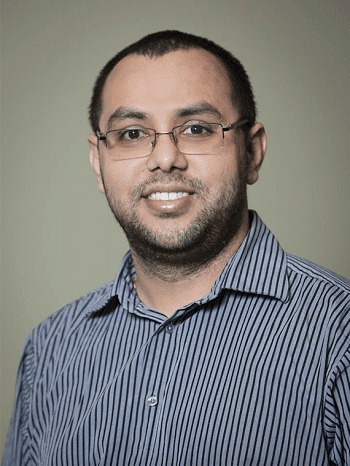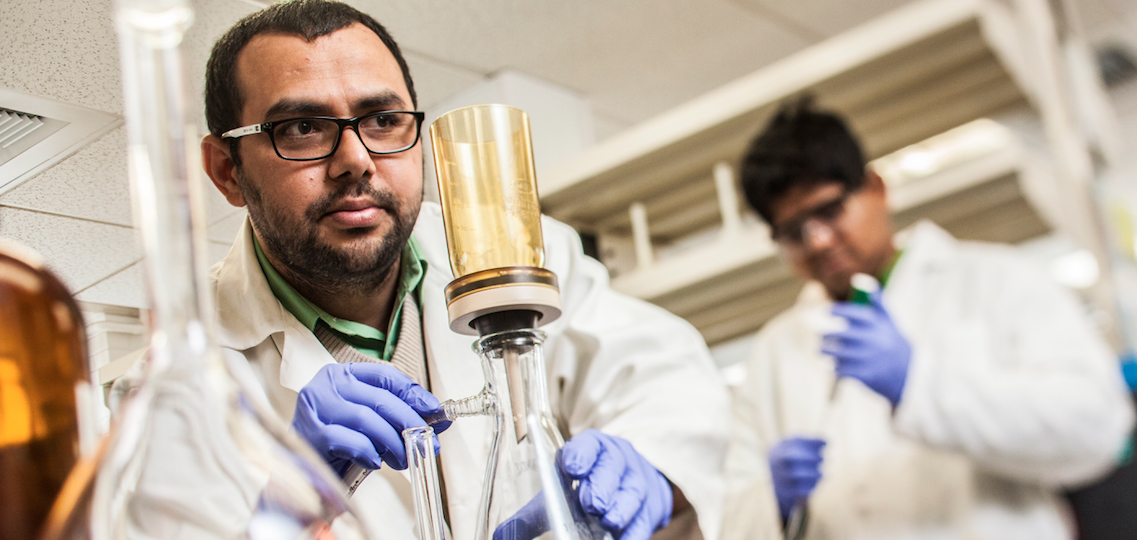College of Engineering doctoral candidate Dinesh Adhikari has been named the first University of Nevada, Reno student to receive the prestigious Department of Energy Student Award and the Soil Chemistry Convener's Award. Both awards come as a result of the research and work Adhikari has done with the coupled biogeochemical cycles of iron and organic carbon in soils.

Along with the Department of Energy award, one of only 52 nationwide, Adhikari has received the Department of Energy Office of Science Graduate Student Research scholarship, which aims to prepare graduate students for careers in science, technology, engineering, or mathematics by providing thesis research opportunities at the Department of Energy laboratories.
At these laboratories, Adhikari will be working with Dr. Nancy Hess who is the Science Theme Lead at Environmental Molecular Science Laboratory at the Pacific Northwest National Laboratory.
"Dr. Hess is well known for her expertise in the application of high-resolution mass spectroscopy for geochemistry," Adhikari said. "By gaining access to the state-of-the-art instruments at PNNL, i hope to advance my research."
In his particular area of soil chemistry, the research Adhikari is able to do with the Department of Energy and Dr. Hess will give him access to one of only two test labs in the world that contains a 21 Tesla Fourier-transform ion cyclotron resonance mass spectrometer.
"My ultimate goal is to investigate the molecular level transformation of natural organic matter during iron redox reactions, and the FTICR-MS will allow us to look into detail at the molecular structure of organic matter and try to understand the differences in the structure of organic matter before and after redox," Adhikari said.
The information Adhikari has already gathered regarding iron redox reactions, and the information he plans to obtain working with Dr. Hess, will lead to and understanding of the role of iron minerals and their redox cycle in carbon stability in soil.
"About 15 percent of carbon in soil is associated with iron minerals," Adhikari explained. "To date, there is very little information available on how natural organic matters are transformed during the iron redox reactions. This information is crucial to accurately model the global carbon biogeochemical cycle."
Assistant professor Yu (Frank) Yang of the civil and environmental engineering department, and Adhikari's doctoral adviser, hopes Adhikari's opportunity to do research at the Department of Defense will also open doors for future University collaborations.
"The DOE has world-class instruments for molecular studies, and Dinesh has been given a well-deserved opportunity to expand on his work," Yang said. "Along with that, his research at the DOE is laying important groundwork for continued collaborations between their scientists and the research we're doing here at the University. It's really a great opportunity at both ends."
Soil Science Society of America
While Adhikari's five-month research stint at the DOE laboratories won't begin until spring 2018, Adhikari will be attending the Soil Science Society of America's annual meeting in Tampa Bay, Florida this October as one of the three recipients of the Soil Chemistry Covener's Award. The award is also recognizing Adhikari's work in iron redox reactions, and will give him the chance to present his research to his fellow award winners and attendees.
"I'll give a 15 minutes presentation about my research, and I'll begin talking about our expansion to include calcium in our work," Adhikari said. "Right now, we're trying to see how calcium might influence soil, because there are many publications showing that calcium and carbon have a very close relationship in soil, and we'll be exploring how iron redox reactions impact that as well."
Along with underlining the implications the recipients' work has on the future of soil chemistry, the Society's award also seeks to highlight the students' leadership abilities and positive research qualities. "The big picture of Dinesh's work is trying to provide the molecular base to better understand climate cycles and climate change, and that's something the Soil Society of America knows is important" Yang said, "but the award also emphasizes Dinesh's impressive track record and his ability to be a leader in soil chemistry and the research that surrounds that area of study."












